- Home >
- Strategic Plan and Focus Areas >
- Wildland Fire
Wildland Fire
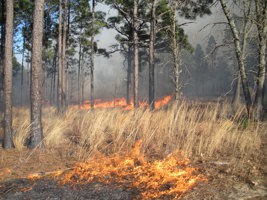
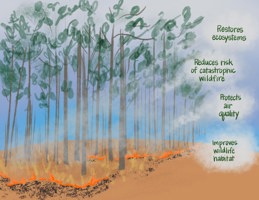
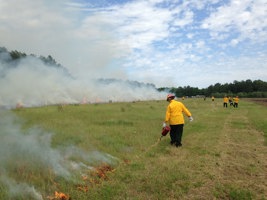
About
Fire is a natural and necessary process for maintaining healthy ecosystems, many of which serve as vital landscapes for military testing and training in the Southeast. Additionally, active military training and testing is a source of routine ignitions on installation training lands and test ranges. When applied in a controlled manner on and surrounding military installations, prescribed fire is a primary land management tool for maintaining accessibility, operational capability and installation resilience. It reduces the buildup of flammable vegetation, lowering the risk of catastrophic wildfires that threaten communities, critical military facilities and mission capabilities. Prescribed fire also sustains the habitats that depend on fire for survival, including many at-risk, threatened and endangered species. The SERPPAS Wildland Fire Work Group brings partners together to carry out a Comprehensive Prescribed Fire Strategy that increases coordination, collaboration, and implementation of prescribed fire across the region. This proactive, landscape-scale approach is critical to strengthening military readiness while safeguarding the Southeast’s biodiversity, resilience and defense mission landscape.
Strategic Objectives
- Identify, encourage, and support efforts to quantify and prioritize the use of prescribed fire to achieve desired conditions.
- Identify needs and opportunities to provide funding, capacity, and other support for prescribed burning in SERPPAS priority areas.
- Encourage new and share successful models of burn teams, Prescribed Burn Associations, and other collaborative burn groups.
- Increase burning across boundaries and sharing of personnel and equipment.
- Increase engagement with landowners, communities, and contractors by supporting programs that provide prescribed burning experience, training, and education.
- Encourage and support the development, dissemination, and utilization of new relevant fire science and tools that foster collaboration among scientists and natural resource managers and address the information needs of SERPPAS, regional fire managers, and partners.
- Promote cooperative conservation, protection of public health, and keeping areas in attainment with the National Ambient Air Quality Standards (NAAQS) by encouraging use of basic and enhanced smoke management practices.
- Support efforts that identify and seek to overcome gaps in knowledge, training, and information needs relevant to prescribed burn practitioners, policy makers, and partners.
- Leverage collaborative fire management partnerships and the research and development community to integrate research and emerging tools into fire operations that serve to enhance safety, effective fire planning, and protection of public health and mission critical values.
Work Group Lead

Jennifer Fawcett
Extension Associate, Forestry & Environmental ResourcesNorth Carolina State University
jennifer_fawcett@ncsu.edu
Jennifer Fawcett is an Extension Associate in the Department of Forestry and Environmental Resources, Extension Forestry at North Carolina State University (NCSU). She coordinates the SERPPAS Prescribed Fire Work Group and assists in implementing actions within the SERPPAS “Comprehensive Strategy for Prescribed Fire.” She received her M.S. degree in Forest Resources from Clemson University, and is working towards her Ph.D. in Agricultural Education and Human Sciences at NCSU, with a focus on Prescribed Burn Associations. Jenn currently serves as an Advisory Board member for the Southern Fire Exchange, is a past President for the North Carolina Prescribed Fire Council, and is on the leadership team for the National Extension Wildland Fire Initiative.
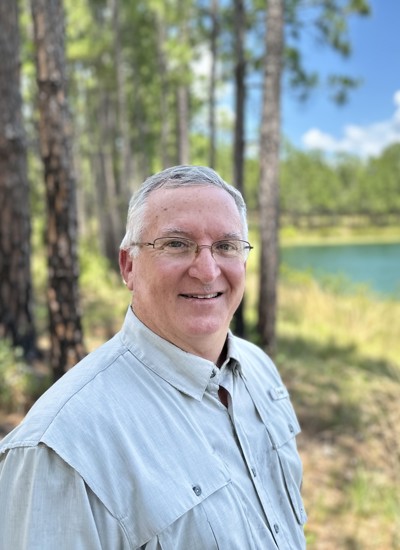
Paul Catlett
SE Regional Wildland Fire Coordinator, DoD Fire & Emergency Management ProgramsTexas A&M Natural Resources Institute
paul.catlett@ag.tamu.edu
Paul Catlett graduated from the University of Florida with a bachelor’s degree in forestry. He worked as a forestry consultant for 7 years primarily conducting land management and prescribed fire in central and south Florida. In 1994, Paul became the Natural Resource Manager of Camp Blanding Joint Training Center, the primary training installation for the Florida National Guard in northeast Florida. Over the past 30 years, the red cockaded woodpecker was recovered on the installation and a wildland fire program was built that suppresses 100+ wildfires and conducts 20,000 acres of prescribed fire annually. In October 2023, Paul retired from the State of Florida and took a position with the Texas A&M Natural Resource Institute to support the Department of War's wildland fire transition to the National Wildfire Coordinating Group.
Request to Join Work Group
Resources
Websites
North Carolina State University Extension Forestry
Southeast Prescribed Fire Update - Driptorch Digest
Southern Fire Exchange - Friends of Fire Podcast
Story Maps
The Fourtown Fire - Fire Management on a Landscape Scale
Webinar Recordings
SECAS Third Thursday Forum: Conducting prescribed fire under stronger air quality standards
Recording
PowerPoint Slides
SFE and SERPPAS Virtual Workshop on PM2.5 and Exceptional Events
*PowerPoint slides are accessible in the YouTube description.
News

Land in Collier, Hendry and Okeechobee counties part of more than 21,500 acres of strategic areas approved by the state
12/17/25
The State of Florida approved an investment of $27.4 million to protect over 21,500 acres of conservation and agricultural lands across the state. The land will be placed under a conservation easement and will provide a critical buffer for key military installations while protecting water quality and aquifer recharge in the Perdido and Escambia river watersheds. The property lies within the Northwest Florida Sentinel Landscape and Florida Wildlife Corridor The acquisitions will strengthen Florida’s conservation network, support military readiness through Sentinel Landscapes, and preserve family-owned agricultural lands, ensuring the state’s natural and rural landscapes remain intact for future generations.
Visit the SERPPAS News Archive
A conservation milestone: 62,000 acres of South Carolina forestland protected through Walmart’s Acres for America
11/22/25
The Pee Dee Basin Initiative, a multi-agency partnership, will permanently conserve more than 62,000 acres of forestland, the largest conservation easement in South Carolina’s history. The conservation easement protects vital habitat for at least 115 plant and animal species, including migratory birds, rare mussels, and Atlantic and shortnose sturgeon. It also preserves 30,000 acres of bottomland hardwoods that absorb floodwater and buffer communities from severe weather events.
Visit the SERPPAS News Archive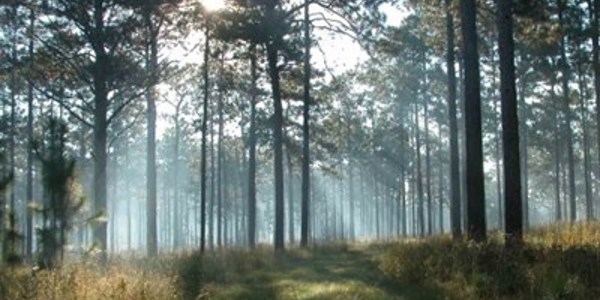
2026 Longleaf Landscape Stewardship Fund RFP Released
11/19/25
The National Fish and Wildlife Foundation released its 2026 Request for Proposals for the Longleaf Landscape Stewardship Fund. This funding supports projects that advance longleaf pine restoration to benefit wildlife, improve water quality, sequester carbon, and enhance forest resilience. Limited funding is also available for the restoration of bottomland hardwoods.
Visit the SERPPAS News Archive
Conserving the Gulf, creating jobs: Reflections on building GulfCorps as a landscape conservation and stewardship program that weaves together workforce development and ecological restoration
11/1/25
Launched as a collaborative effort in the wake of the BP Deepwater Horizon Oil Spill in 2010 between The Nature Conservancy and dozens of federal, state, and local partners, the GulfCorps program offers a chance for young adults in the Gulf states to be a professional in a field that manages their own environment. The GulfCorps represents a powerful approach to improving landscape resilience through a community-led restoration approach that recognizes workforce development as a long-term strategy for advancing better futures for our lands, waters, and communities.
Visit the SERPPAS News Archive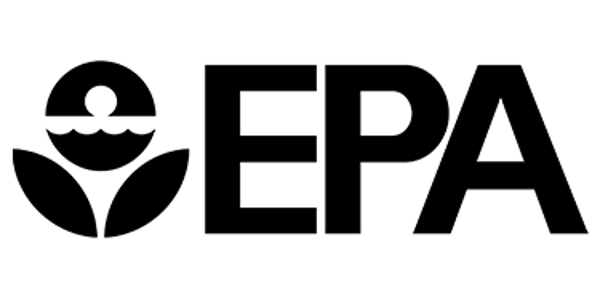
EPA Issues Policy Guidance to Help Prevent Catastrophic Wildfires, Promote Use of Prescribed Fires for Mitigation Efforts
10/16/25
The Environmental Protection Agency (EPA) released new policy guidance to eliminate regulatory obstacles to prescribed burning. Regional offices are directed to collaborate with state, local, Tribal, and federal partners to revise State Implementation Plans (SIPs) so that they support strategic fire use. The guidance recognizes prescribed fire as critical for reducing catastrophic wildfire risk and allows it to be classified as an “exceptional event” under the Clean Air Act, providing air quality flexibility in fire-adapted regions. For the Southeast, this policy aligns air-quality regulations with ecological fire needs, enabling safer, more effective burns and reinforcing prescribed fire as a cornerstone of wildfire resilience and ecosystem health.
Visit the SERPPAS News Archive
Conservation Florida Permanently Protects 2,317 Acres at Eagle Haven Ranch
9/3/25
Conservation Florida has permanently protected 2,317 acres of Eagle Haven Ranch, a critical ecological area along Lake Kissimmee's shoreline in the Northern Everglades. Once threatened by luxury resort development, the land is now safeguarded through a conservation easement supported by partners including philanthropists Arnie and Lauren Bellini, the U.S. Department of Defense’s Readiness and Environmental Protection Integration (REPI) Program, and the USDA’s Agricultural Land Easement (ALE) Program.
Visit the SERPPAS News Archive





Events & Webinars
- DoD Applied Innovation Workshop
-
March 2 - 6, 2026
Washington, DC - Spring 2026 SERPPAS Steering Committee Meeting
-
March 3 - 4, 2026
Atlanta, GA - 4th International Smoke Symposium
-
March 23 - 27, 2026
Tallahassee, FL - National Conference on Ecosystem Restoration
-
April 13 - 16, 2026
Omaha, NE - 2026 SERPPAS Principals Meeting
-
April 27 - 28, 2026
Southern Pines/Pinehurst, NC - Association of Natural Resource Extension Professionals 15th Biennial Conference
-
May 12 - 15, 2026
Wilmington, NC - Association of Natural Resource Extension Professionals 15th Biennial Conference
-
May 12 - 15, 2026
Wilmington, NC - 8th Fire in Eastern Oak Forest Conference
-
June 2 - 4, 2026
Bloomington, IN - 80th Annual SEAFWA Conference
-
October 26 - 30, 2026
Nashville, TN
SERPPAS Meetings
March 2026
- Spring 2026 SERPPAS Steering Committee Meeting
-
March 3 - 4, 2026
Atlanta, GA
April 2026
- 2026 SERPPAS Principals Meeting
-
April 27 - 29, 2026
Pinehurst/Southern Pines, NC






